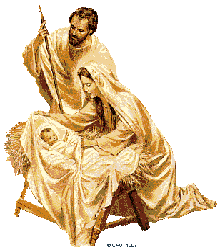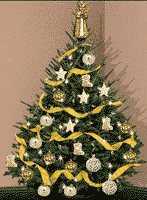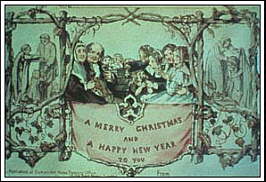The
Origin of the Christmas Celebration
 Celebrations during the
mid-winter season were common, even before Christmas was celebrated on December 25.
Christmas was once a moveable feast celebrated many different times during the
year. The
choice of December 25 was made by the Pope Julius I in the fourth century AD because this
coincided with the pagan rituals of Winter Solstice, or Return of the Sun. The intent was
to replace the pagan celebration with the Christian one. In 1752, 11 days were dropped
from the year when the switch was from the Julian calendar to the Gregorian
calendar. The
December 25 date was effectively moved 11 days backwards. Some Christian church
sects,
called old calendarists, still celebrate Christmas on January 7 (previously
Dec. 25 of the
Julian calendar.) Many of the traditions associated with Christmas (giving
gifts, lighting
a Yule log, singing carols, decorating an evergreen) hark back to older
religions. Celebrations during the
mid-winter season were common, even before Christmas was celebrated on December 25.
Christmas was once a moveable feast celebrated many different times during the
year. The
choice of December 25 was made by the Pope Julius I in the fourth century AD because this
coincided with the pagan rituals of Winter Solstice, or Return of the Sun. The intent was
to replace the pagan celebration with the Christian one. In 1752, 11 days were dropped
from the year when the switch was from the Julian calendar to the Gregorian
calendar. The
December 25 date was effectively moved 11 days backwards. Some Christian church
sects,
called old calendarists, still celebrate Christmas on January 7 (previously
Dec. 25 of the
Julian calendar.) Many of the traditions associated with Christmas (giving
gifts, lighting
a Yule log, singing carols, decorating an evergreen) hark back to older
religions.
What is the origin of the
Christmas Tree?
 Predecessors of the
Christmas tree can be seen in pagan customs of tree worship, which
involved bringing trees indoors and adorning them to ensure good crops
the following year. Predecessors of the
Christmas tree can be seen in pagan customs of tree worship, which
involved bringing trees indoors and adorning them to ensure good crops
the following year.
Martin Luther is said to have started the tradition of the lighted
Christmas tree in the 16th century in Germany. The sight of an
evergreen tree on Christmas eve, with stars blazing above, is said to
have made a great impression on him, and he put a similar tree,
decorated with lighted candles in his home. By the mid-1800's, the
custom of trimming Christmas trees had spread rapidly throughout the
world.
In 1882, the world's first electrically lighted Christmas tree was
decorated in the New York City home of Edward Johnson, a colleague of
Thomas Edison. Today, more than 72 million trees are trimmed each
Christmas season, 35 million of which are real trees and 37 million
artificial.
The Origin of
the Christmas Card
 According
to Britannica Online, though wood engravers produced prints with religious
themes in the European Middle Ages, the first Christmas card, as the term is now
understood, is believed to have been designed by John Callcott Horsley in
England in 1843, created for his friend Sir Henry Cole. An edition of 1,000
cards was placed on sale in London. It was lithographed on stiff cardboard, 5
1/8 by 3 1/4 inches, in dark sepia and hand-colored. The center of the card
shows a family party in progress, beneath which were the words "A Merry
Christmas and a Happy New Year to You." To one side is a scene of the
hungry being fed and to the other side the poor being clothed. In the United
States, the owner of a variety store in Albany, N.Y., in the mid-19th century
produced a card carrying Christmas greetings from "Pease's Great Variety
Store in the Temple of Fancy." According
to Britannica Online, though wood engravers produced prints with religious
themes in the European Middle Ages, the first Christmas card, as the term is now
understood, is believed to have been designed by John Callcott Horsley in
England in 1843, created for his friend Sir Henry Cole. An edition of 1,000
cards was placed on sale in London. It was lithographed on stiff cardboard, 5
1/8 by 3 1/4 inches, in dark sepia and hand-colored. The center of the card
shows a family party in progress, beneath which were the words "A Merry
Christmas and a Happy New Year to You." To one side is a scene of the
hungry being fed and to the other side the poor being clothed. In the United
States, the owner of a variety store in Albany, N.Y., in the mid-19th century
produced a card carrying Christmas greetings from "Pease's Great Variety
Store in the Temple of Fancy."
|
